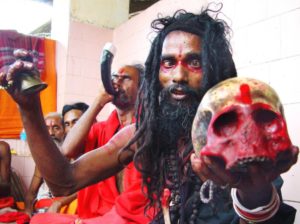Karnataka assembly passes anti-superstition bill

A 10-year-old girl was sacrificed in Bengaluru, to cure a paralysed man In March, 2017. Source-
Representational image. Reuters
Amidst protests, the Karnataka legislative assembly passes the popular anti-superstition bill, listing the banned superstitious practices.
India is known as a land of snake charmers to the world and superstitions have been the part and parcel of the country since ages. The superstitious practices in India exist in extreme forms, it can be as controversial as the Sati, in which widows were forced to sit on their husband’s pyre and burn to death, or it can be as small as believing it to be unlucky if a black cat crosses the path.
Few Indian ‘rationalists’ have lost their lives in fighting these superstitions, deep-rooted in the Indian society. The state government of the country are now finding it important to implement rules against inhuman practices in the name of superstition and Karnataka has taken its first step towards this goal.
Karnataka legislative assembly recently passed a bill which lists the banned superstitious practices after two amendments, to prevent and eradicate “inhuman evil practices”. The bill was passed by the state’s legislatively assembly on November 16. According to the bill, violation of the rules will be a punishable offence. The person liable for the violation will be subject three months of imprisonment and a fine up to INR 5,000 or both.
Karnataka Prevention and Eradication of Inhuman Evil Practices and Black Magic Bill, 2017, a bill that would end practices such as siddubhukti (eating on a dead human body), maata, okuli (throwing coloured water on women from lower castes), bettaleseve (nude worship) and panktibheda (separate seating arrangements for Brahmins and non-Brahmins for meals) still needs approval from the state’s legislative council and the governor.
Background
The bill was first drafted by National Law School of India University, Bengaluru in 2013 and was named The Karnataka Prevention of Superstitious Practices Bill, 2013. After few changes to the popularly known anti-superstition bill, the bill was called The Evil, Inhuman and Superstitious Practices Prevention Bill. In 2016, when the amended bill was presented in the assembly, it was protested by several politicians on the grounds that it would hurt religious sentiments of some.
Several civil society groups were demanding to pass this bill in the state, the pressure increased after the murder of rationalist MM Kalbugi in 2016, who formerly served as the vice chancellor of the Kannada University in Hampi, was shot dead in his home.
In 2017, the bill was tabled in a session when BJP members were on a protest, demanding the resignation of K.G. George, Bengaluru Development Minister, who has been allegedly charged in the Deputy M K Ganpathy’s suicide case. The bill was presented by the Law and Parliamentary Affairs Minister T B Jayachandra.
B. Jayachandra, the state’s law minister confirmed, “For removal of doubts, nothing in the act shall apply with respect to the forms of worship mentioned under the heading ‘savings’ in the proposed act, like pradakshina, yatras, parikramas performed at religious places, among other normal practices,”
The BJP member G. Mariswamy commenting on the bill, he said, “People know what is good for them, it should be left on their discretion to take part in a practice or not. The government should interfere only when someone is being forced to do something against their will.”
Similar case of Maharashtra
Similar to this bill, Maharashtra government after the murder of rationalist Dr Narendra Dabholkar’s in 2013 passed Maharashtra Prevention and Eradication of Human Sacrifice and other Inhuman, Evil and Aghori Practices and Black Magic Act, 2013. The original bill of this article was drafted by activist Narendra Dabholkar in 2003, which somehow could not find its way to become an act till 2013.









